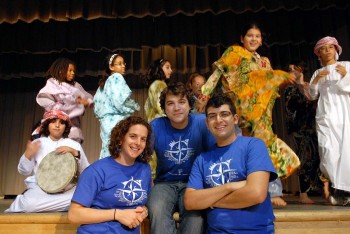Bringing Arab Culture to Area Youth

Left to right: Chloe Tucker '07, Musa Hamideh '09 and Samee Sulaiman '10 work at Al-Bustan Seeds of Culture, an Arab arts and culture organization in Philadelphia. Behind them, dancers rehearse a traditional Emirati dance.
Details
As the young participants in the Al-Bustan Seeds of Culture summer camp performed during their end-of-camp celebration, senior counselor Chloe Tucker '07 glanced at the faces of their guests of honor—representatives from the United Arab Emirates (UAE) embassy—to gauge their reactions.
“They were all smiles,” she says.
The campers, ages seven to 17, had spent the past three weeks learning about the music, language, art, science, and natural environment of the UAE. Now, they were displaying the fruits of their education for their distinguished guests. The younger children performed traditional UAE dances and original plays, based on UAE history, that the students had written themselves. The oldest group of campers presented their own stop-action animated film, a public service announcement about racism.
“The embassy representatives were very excited, and loved every performance,” says Tucker.“It was a delightful mix of American theater and UAE tradition.”
The camp is the flagship program of Al-Bustan Seeds of Culture, where Tucker and fellow counselors and Haverford alumni Musa Hamideh '09 and Samee Sulaiman '10 have worked throughout the past year. The Philadelphia-based organization educates young people in Arabic language, arts and culture with classes and workshops throughout the year.
According to Tucker, the camp, which takes place at Springside School in the city's Chestnut Hill area, is the only three-week intensive camp of its kind in the country. Every year, the camp highlights a different part of the Middle East.“We focused on the UAE this year because it's a place where traditional and new ideas thrive,” says Tucker.
Tucker joined Al-Bustan in 2009 as an AmeriCorps fellow, working as a marketing/communications/outreach coordinator. From the beginning, she was impressed by what she deems the“phenomenal” caliber of Al-Bustan's teaching artists.“One of our visual arts teachers, Tremain Smith, has pieces in the permanent collection of the Metropolitan Museum of Art, and some of our musicians, including violinist Hanna Khoury, have performed with Sting and Shakira, and have recorded with the biggest names in Middle Eastern music,” she says.
Musa Hamideh was encouraged to become part of Al-Bustan by his friend Tucker, and is now a program coordinator. He, in turn, convinced his friend Samee Sulaiman to join as an administrative and program assistant. Both are Palestinian: Hamideh was born in the U.S., but his family still resides in Palestine and he lived there himself for several years as a teenager. Sulaiman has spent summers in Palestine, but was born and raised in Brooklyn, where his immediate family still lives. His father's family is still in Palestine, but his mother's family, who were refugees during the 1967 war, live in Jordan and are not allowed to return to their home country.
Of Al-Bustan, Hamideh says,“I wanted to work with an organization that used language and culture as a means of dialogue and cross-cultural communication.” Adds Sulaiman,“It was a great opportunity to explore my own Arab identity through an artistic and cultural framework, as opposed to a political one.”
All three Fords value their experiences as camp counselors.“I've never been part of a more diverse community,” says Tucker, who notes that the campers came from a variety of ethnic backgrounds.
“They were very curious and excited to learn,” says Sulaiman of the campers.“I enjoyed seeing them explore their own identities through so many creative outlets.”
“I found that I was still a student in many ways,” says Hamideh, who assisted with percussion lessons and Arabic-language classes, where he bolstered his own vocabulary in the process.
Hamideh will remain with Al-Bustan full time, helping to sponsor arts education in Philadelphia schools. Tucker and Sulaiman, both religion majors, are considering graduate schools.“However, I still want to be involved with Al-Bustan in some capacity,” says Sulaiman.
-Brenna McBride



